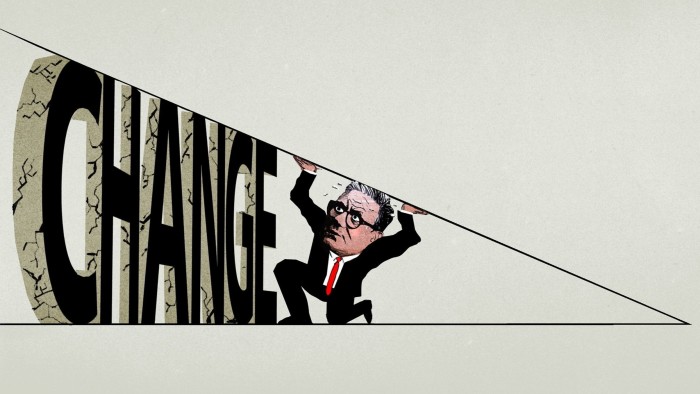Unlock the Editor’s Digest for free
Roula Khalaf, Editor of the FT, selects her favourite stories in this weekly newsletter.
Since 2016, British voters have been telling their political leaders that things have to change. From Brexit, through Boris Johnson and finally a landslide win for Sir Keir Starmer’s one-word promise of “change”, an electorate worn down by stagnating incomes and failing public services has made its expectations clear.
Those at the top of Labour want to see themselves as agents of change. Morgan McSweeney, Starmer’s chief of staff, holds meetings on how to be seen as an insurgent government. And yet that looks distant. In the words of one ally, “Somehow we have reached a place where Labour is seen as the party of the status quo and it’s the right that represents change.”
In some respects this is unfair. In planning and clean energy, Labour is pursuing transformational reforms but it looks too much like a business-as-usual administration. This partly explains the opinion poll surge of Nigel Farage’s Reform UK, which is terrifying Starmer’s MPs. Leading party figures quote a recent podcast by American journalist Ezra Klein on how the US Democrats lost the battle for attention, and worry that is happening here as Farage woos traditional Labour voters.
There are three obvious issues. The first is the demeanour of Starmer and other senior figures. The prime minister does not come across as a disrupter. The problem has been compounded by early errors both on means testing pensioner fuel payments and on clothes provided by donors — allowing critics to paint them as just another set of self-serving politicians.
Nor has the government exuded urgency. There are too many reviews and consultations, too much deference to the Treasury. If planning and infrastructure reform is so central, why are we still waiting for legislation? We will be into the second year of this government before it can have an impact. Why will it be Easter before NHS reforms are unveiled?
The third problem is confused messaging. Starmer talks of prioritising growth — this is the right call. But taxes are still rising and the employment bill, offering more rights for workers and power for unions, alarms business. Labour is torn between siding with working people and Treasury efforts to dilute the proposals. And while growth is the right imperative, the language of productivity and GDP does not resonate with the public.
There has been more urgency since the new year. There were welcome signs of impatience in Rachel Reeves’ move to call in and chew out regulators she believed were standing in the way of growth, as well as in the ousting of the chair of the Competition and Markets Authority. Starmer has shown similar irritation with environmental watchdogs. The critique of a failing state bureaucracy is now common to all parties. Even so, when compared with Donald Trump’s flame-throwing assaults, you see why Labour style looks too decorous to be insurgent.
And fresh impetus on the economy is yet to be matched with the broader revamp strategists think the party needs, not least because they are unsure how far to compete with populism.
The IPPR, a Labour think-tank at the heart of thinking about insurgent government, says the party must be seen to pick fights to show it is on the side of those let down by politics. Its director, Harry Quilter-Pinner, says ministers “must not end up like progressives elsewhere, defending a failing status quo. Disenchanted and distrusting voters want to see them visibly and vocally standing up for their interests.”
Where might these fights take Labour? Putting workers ahead of big business sends a signal, albeit a double-edged one given the weakness of the economy. Prioritising tenants over landlords and non-graduates over graduates with a focus on skills and apprenticeships does, too. Taxing wealth to fund public services, whether second homes or investments, draws dividing lines. Assailing the sclerotic bureaucracy also works. Wes Streeting, health secretary and one of the few in cabinet who can compete in the war for public attention, talks of fighting vested interests within the NHS to improve healthcare. Now people need to see him doing it.
Some of these directions would worry MPs. This is still the Labour party. Taking on public servants or the unions is not in its DNA. It does not want to match Reform on immigration and is uneasy with cutting the huge increase in sickness benefits even though a rising number of voters think the rules are too lenient. But it can offer better, bolder ideas. Digital ID cards, for example, could deter clandestine asylum seekers and signal recognition of the concerns about immigration.
Drawing these stark dividing lines will also be uncomfortable for more affluent voters and must be balanced with growing the economy. But one strategist argues if Labour does not look able to reform “rigged” institutions, “voters will turn to parties that promise to smash them up”.
A central lesson from Trump — and Johnson — is the power of constant signalling, in the rows you seek, the groups intentionally antagonised and the relentless messages to allies. The lesson is that not only must policies deliver improvements, they must also demonstrate hunger for change.
Quiet competence is no longer an adequate currency in politics. Having won as a change party, Labour knows it must get a lot better at looking like one.







